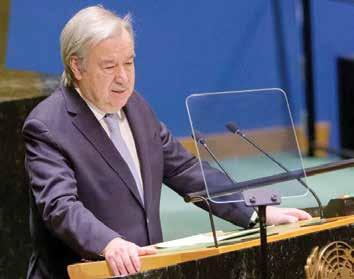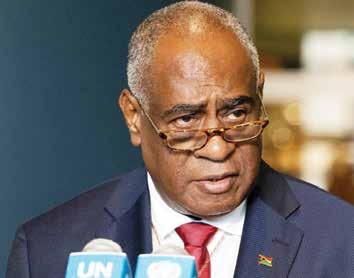
2 minute read
International Court to look at climate change
The Queensland Government has refused Clive Palmer’s Galilee Coal Project following the recommendation of the Queensland Land Court late last year.
“Environmental Defenders Office clients Youth Verdict and the Bimblebox Alliance brought an historic legal challenge to the massive new fossil fuel project won,” Senior Solicitor Alison Rose said on Monday. “Today’s final decision to refuse the environmental authority brings an end to the epic battle.
“Our heartfelt congratulations and gratitude goes to our clients and First Nations witnesses in the case.”
Read more about the landmark victory here:
Sian Scott <sian.scott@djarragun.qld.edu.au>
The UN General Assembly said will seek the opinion of the International Court of Justice (ICJ) on countries’ obligations to address climate change, following the adoption by consensus of a resolution on Wednesday last week.
The resolution was put forward by the cyclone-battered Pacific Island nation of Vanuatu, supported by a “core group” of 17 countries from various regions, and was focused on the adverse impacts of climate change on small island developing States as well as climate justice.

The ICJ, also known as the World Court, is the UN’s principal judicial organ.
Although its advisory opinions were not legally binding, they carried legal authority and moral weight.
Speaking ahead of the vote, UN Secretary-General António Guterres said the Court’s advisory opinions had tremendous importance.

“If and when given, such an opinion would assist the General Assembly, the UN and Member States, to take the bolder and stronger climate action that our world so desperately needs,” he said.
Mr Guterres pointed to the latest climate science, unveiled this month, which confirmed that humans were responsible for virtually all global heating over the past 200 years.
The report by the Intergovernmental Panel on Climate Change (IPCC) further showed that limiting global temperature rise to 1.5 degrees Celsius above pre-industrial levels, was achievable – but time was running out.
The UN chief stressed that now was the time for climate action and climate justice.
“The climate crisis can only be overcome through cooperation –between peoples, cultures, nations, generations,” he said.
“But festering climate injustice feeds divisions and threatens to paralyse global climate action.”
Vanuatu Prime Minister Alatoi Ishmael Kalsakau said ambition towards achieving the 1.5-degree target was, “still far from what is needed”, and an ICJ advisory opinion could provide clarity that would benefit global efforts to address the climate crisis and further boost cooperation.

He said the final text of the resolution was the result of lengthy consultations and deliberations, and he also highlighted the important role played by young law students in the Pacific who inspired the initiative.
“The intense and engaged negotiations with the core group as well as with a broader UN membership, were an indication of the importance of this initiative, but also of the collective desire to work towards addressing the climate crisis,” he said.

“This is not a silver bullet, but it can make an important contribution to climate change, climate action, including by catalyzing much higher ambition under the [2015] Paris Agreement.”
UN High Commissioner for Human Rights, Volker Türk, issued a statement which warmly welcomed the “landmark resolution”.
He said his Office, OHCHR, had extensively documented the human rights impacts of climate change and set out the human rights obligations of States and other actors.
“States have obligations to mitigate and adapt to – and address loss and damage resulting from – climate change,”
“We look forward to sharing this expertise in this






